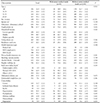Abstract
Background
South Korea has the fastest growing aging population in the world, and older people require more healthcare services. Unmet healthcare needs still exist in Korea due to several complex reasons. This study aimed to evaluate the factors associated with unmet healthcare needs of the older Korean population.
Methods
This cross-sectional study included 1,194 older adults, aged 65 years and older, who participated in the Seventh Korea National Health and Nutrition Examination Survey conducted in 2017. Sociodemographic factors, lifestyle and health status, comorbidity, and unmet healthcare needs were included in this study's analysis. Multiple logistic regression analysis was used to evaluate the association between unmet healthcare needs and other factors.
Results
The prevalence of unmet healthcare needs in this study population was 7.8%. After adjusting for age, sex, education level, household income, living alone, private health insurance, regular walking, body mass index, unintended weight loss, and osteoarthritis, women (adjusted odds ratio [aOR], 1.921; 95% confidence interval [CI], 1.061–3.479) and unintended weight loss (aOR, 2.218; 95% CI, 1.105–4.453) were more likely to have unmet healthcare needs than their counterparts. The group with general obesity (aOR, 1.691; 95% CI, 1.015–2.816) was more likely to have unmet healthcare needs than the group with normal body mass index.
Figures and Tables
References
1. Bennett AC, Rankin KM, Rosenberg D. Does a medical home mediate racial disparities in unmet healthcare needs among children with special healthcare needs? Matern Child Health J. 2012; 16:Suppl 2. 330–338.

2. Newacheck PW, Stoddard JJ, Hughes DC, Pearl M. Health insurance and access to primary care for children. N Engl J Med. 1998; 338(8):513–519.

3. Jeong HS. Korea's National Health Insurance--lessons from the past three decades. Health Aff (Millwood). 2011; 30(1):136–144.

4. Shin YJ, Shon JI. The prevalence and association factors of unmet medical need-using the 1st and 2nd Korea welfare panel data. Health Soc Welf Rev. 2009; 29(1):111–142.
5. Ahn YH, Kim NH, Kim CB, Ham OK. Factors affecting unmet healthcare needs of older people in Korea. Int Nurs Rev. 2013; 60(4):510–519.

6. Alonso J, Orfila F, Ruigómez A, Ferrer M, Antó JM. Unmet health care needs and mortality among Spanish elderly. Am J Public Health. 1997; 87(3):365–370.

7. Herr M, Arvieu JJ, Aegerter P, Robine JM, Ankri J. Unmet health care needs of older people: prevalence and predictors in a French cross-sectional survey. Eur J Public Health. 2013; 24(5):808–813.

8. Kim YS, Lee J, Moon Y, Kim KJ, Lee K, Choi J, et al. Unmet healthcare needs of elderly people in Korea. BMC Geriatr. 2018; 18(1):98.

9. Kim YS, Han SH, Lee JM, Shin G, Choi JK, Park JM. Senior friendly hospital: a new paradigm for the hospital-based care of the elderly. Korean J Clin Geriatr. 2017; 18(1):8–14.

10. Pappa E, Kontodimopoulos N, Papadopoulos A, Tountas Y, Niakas D. Investigating unmet health needs in primary health care services in a representative sample of the Greek population. Int J Environ Res Public Health. 2013; 10(5):2017–2027.

11. Choi SH, Cho YT. Sex differentials in the utilization of medical services by marital status. Korea J Popul Stud. 2006; 29(2):143–166.
12. Park EA, Lee IS. Factors affecting the depression of the elderly women in poverty. J Agric Med Community Health. 2009; 34(2):256–266.

13. Im EO, Meleis AI. A situation-specific theory of Korean immigrant women's menopausal transition. Image J Nurs Sch. 1999; 31(4):333–338.

14. Fried LP, Tangen CM, Waltson J, Newman AB, Hirsch C, Gottdiener J, et al. Frailty in older adults: evidence for a phenotype. J Gerontol A Biol Sci Med Sci. 2001; 56:M146–M156.

15. Hoogendijk EO, Muntinga ME, van Leeuwen KM, van der Horst HE, Deeg DJ, Frijters DH, et al. Self-perceived met and unmet care needs of frail older adults in primary care. Arch Gerontol Geriatr. 2014; 58(1):37–42.

16. Chen J, Hou F. Unmet needs for health care. Health Rep. 2002; 13(2):23–34.
17. Diamant AL, Hays RD, Morales LS, Ford W, Calmes D, Asch S, et al. Delays and unmet need for health care among adult primary care patients in a restructured urban public health system. Am J Public Health. 2004; 94(5):783–789.

18. Hwang BD, Choi R. The prevalence and association factors of unmet medical needs by age group in the elderly. Korean J Health Serv Manag. 2015; 9(1):81–93.

19. Moon J, Kang M. The prevalence and predictors of unmet medical needs among the elderly living alone in Korea: an application of the behavioral model for vulnerable populations. Health Soc Welf Rev. 2016; 36(2):480–510.




 PDF
PDF ePub
ePub Citation
Citation Print
Print




 XML Download
XML Download